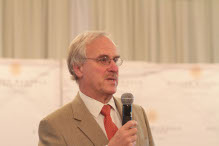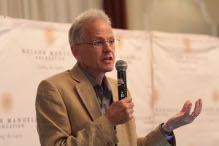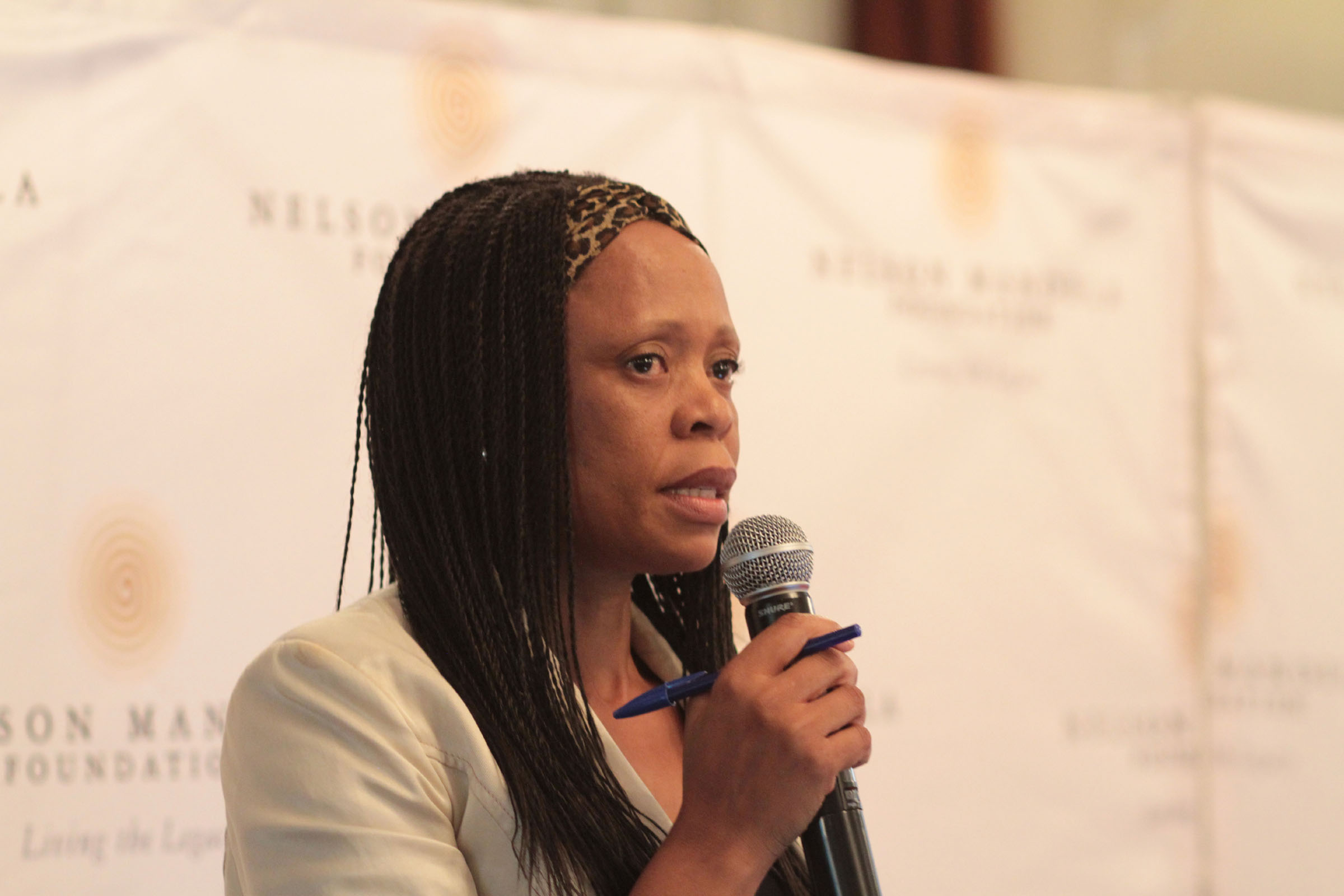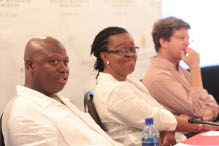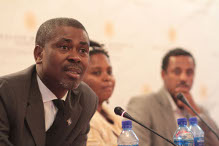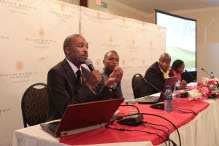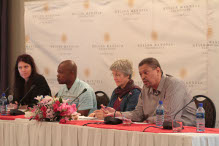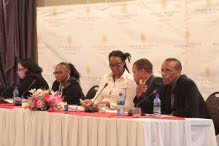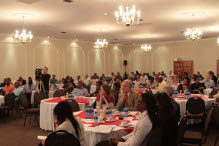
Over 150 people attended the HIV/AIDS Consultative Forum
November 18, 2010 – The Nelson Mandela Foundation hosted a two-day consultative forum at Cedar Park Hotel and Conference Centre in Sandton this week to reflect on the two-year HIV/AIDS community conversations programme.
Attended by facilitators, stakeholders, Foundation staff and members of civil society and government, the forum also afforded the opportunity to chart the future for the programme, and identify potential donors.
After the Youth in dialogue series in 2007, community conversations were first introduced in 2008, and employ the Community Capacity Enhancement (CCE) methodology developed by the United Nations Development Programme (UNDP) to help communities identify the main drivers of HIV and brainstorm solutions to the challenges they face.
To kickstart the second day of the forum, Peter Conze, the country director of the GTZ in South Africa – the German Society for Technical Cooperation – spoke about the challenge that HIV/AIDS presents in South Africa and about the GTZ’s involvement with the Foundation.
“HIV/AIDS is one of the most pressing problems in South Africa. One of the instruments we use to curb the spread of the [virus] is community conversations.
“GTZ is the main funder of community conversations. The partnership with the Foundation started in 2008 and we are now taking stock to see where we are ... and what we can improve on,” Conze said.
Head of the Foundation’s Dialogue Programme, Mothomang Diaho, highlighted the importance of the day’s proceedings: “We are here to share lessons from implementing this strategy and secure commitments from potential funders. It is through dialogues like this one that the methodology gets strengthened,” she said.
In his keynote address Ian Campbell, a physician who designed the community counselling aspect of the community capacity enhancement, focused on the capacity that people have for responding to HIV/AIDS. He looked at the format of community conversations and how they naturally take root in communities, harnessing the inherent knowledge and expertise found there. He gave numerous examples of conversations around the world which, once they had been launched, organically extended to other communities, affording others the space to work through common challenges and potential solutions.
Campbell said that local communities should be allowed to continue the conversations process on their own: “Communities have the capacity to relate, have insight and make the change in their lives ... Intervention is necessary at the beginning and then the will of the people needs to be engaged.”
His speech was followed by a panel discussion on communication for social change, facilitated by Denise Gray-Felder, President of the Communication for Social Change Consortium
Panellists were Matebogo Mampane from Soul City, Garth Japhet from Heartlines, and Paddy Nhlapo from Cool Ideas, who addressed how community dialogue is essential to social change, and the role that advocacy plays in promoting dialogue as an effective approach.
Mampane spoke about how dialogue creates opportunities for community members to engage on issues that are not usually spoken about.
Japhet developed on Mampane’s sentiments: “Dialogue is the centre of social change. We make sense of what is not normal in our society through dialogue. [It] inspires change and provokes discussion.”
He continued by saying that scepticism around the effectiveness of dialogue was connected to humanity’s tendency toward quick fixes, a view of the methodology he quickly countered: “Community dialogues offer individuals quantitative results even though it takes time. We need to find effective ways to sustain it.”
The next session gave community conversation facilitators an opportunity to reflect on some of the successes and challenges of their regional experience. Lesley Nkosi, moderator for the session, opened the session with insights into personal changes in his life since he became part of the conversations process.
Olebogeng Nkoliswa recounted stories of how successful community conversations had been in his township of Soshanguve, near Pretoria.
“In my community, young people are more affected by drugs and HIV/AIDS. From attending conversations, two groups have been formed by the youth to raise awareness about drug abuse and the dangers of unprotected sex. Young people of Soshanguve are taking a stand. They are saying, ‘Yes we can.’”
Mbali Gumede, a facilitator from KwaMakhutha in KwaZulu-Natal, said the community conversations process had helped unite her community, which had been struggling with political division since the 1980s.
“In one of the conversations, two guys who had been terrorising the community stood up and asked for the community to help them get over their drug addiction, and the community embraced them with open arms and also arranged for these youth to go to a drug rehabilitation centre.
“There is also a “cleansing ceremony” planned for December [in which] traditional healers, pastors and political parties will participate and stand in unity, in efforts to wash away the pain their past brings.” Gumede said.
Ailish Byrne, a senior associate at the Communication for Social Change Consortium, moderated a session on the importance of Participatory Monitoring and Evaluation related to community conversations. Alison Campbell from AFFIRM, Heston Philips from UNAIDS, and facilitator Motlatsi Lekhuleni participated.
In response, Lekhuleni recounted stories from Kimberley and Giyani where initiatives were started as a result of community conversations. According to Lekhuleni, if he hadn’t done monitoring and evaluation, he wouldn’t have known about these initiatives. Campbell encouraged facilitators to share stories of success from communities to keep themselves motivated, even after the programme had ended.
Benjamin Ofosu-Koranteng from the UNDP moderated a panel discussion on linking community conversations to municipal planning emphasising how, through community conversations, grassroots stories and experience can inform high-level policy. His panel included Mesfin Getahun from UNDP Ethiopia and Rachel Basirika from AMICAALL Namibia. The aim of this session was to share CCE methodology lessons from other countries.
Korateng said: “The first lesson is that, until we have a way to assess what communities think about development, it won’t work. Unless this body of knowledge and experience are fed into existing planning processes, there will be a vacuum.”
The last session of the forum was moderated by Denise Grey Felder with panellists Connie Kganakga from DOSD; Gift Buthelezi from the Department of Communications Kgosi Letlape from the Tshepang Trust, and Catherine Sozi country co-ordinator of UNAIDS. Letlape spoke on the need for safe spaces for women, men, and children; the role of women in a patriarchal society; the importance of education for facilitators and the importance of understanding society’s cultural practices.
“As a society we need to create spaces where we can talk about social values and norms. Culture can be questioned, he said, and the youth need to be taught about cultural norms and practices. They need to know how to respond to questions about multiple concurrent partnerships, polygamy and so forth during community conversations. as these can lead to the spread of HIV/AIDS.
“We need to address issues in a truthful manner for society to make informed decisions. Once people are told the truth they will make better decisions.”
Catherine Sozi, concluded by saying that unless HIV/AIDS is regarded as a broader developmental and human rights issue, not only as a health issue, then South Africa is still going to be faced with the massive impact of the epidemic.
“Unless we do things differently, there is not going to be much change in communities. We need to politicise community conversations [and] lots of advocacy needs to be done on all levels. From grassroots level to provincial level, dialogue needs to happen,” she said.
The forum ended on a high note, with the UNDP pledging to put funding for community conversations on the agenda in their strategic planning sessions. Gift Buthelezi from the Department of Communications committed to looking at how information and communication technologies can be used to publicise community conversations, while Connie Kganakga from the Department of Social Development said she was interested in forming partnerships with the Nelson Mandela Foundation: “We need to have structure in communities where we can enhance the capacity of communities and therefore move forward.”
Download Ailish Byrne’s presentation on monitoring and evaluation here.
To download Dr Ian Campbell’s presentation (10MB) please click here
